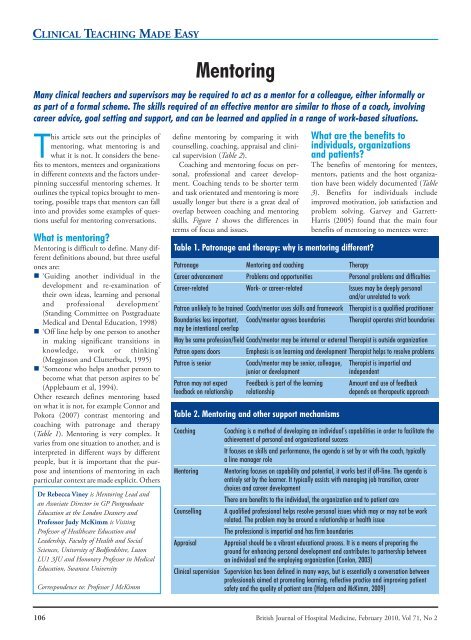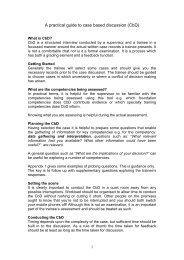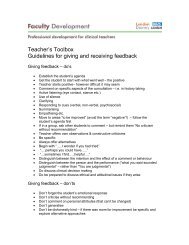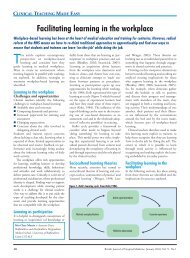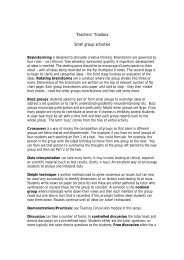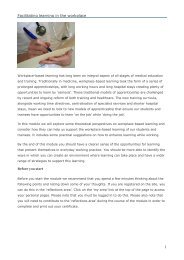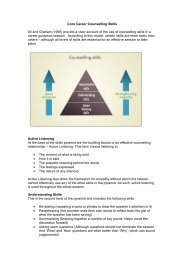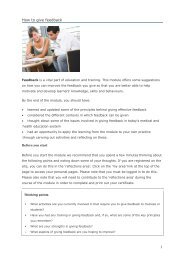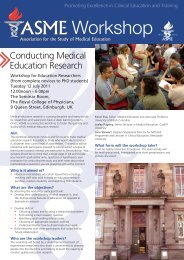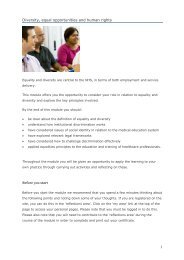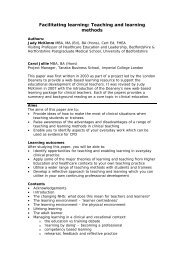Mentoring - Faculty Development - London Deanery
Mentoring - Faculty Development - London Deanery
Mentoring - Faculty Development - London Deanery
You also want an ePaper? Increase the reach of your titles
YUMPU automatically turns print PDFs into web optimized ePapers that Google loves.
Clinical Teaching Made Easy<strong>Mentoring</strong>Many clinical teachers and supervisors may be required to act as a mentor for a colleague, either informally oras part of a formal scheme. The skills required of an effective mentor are similar to those of a coach, involvingcareer advice, goal setting and support, and can be learned and applied in a range of work-based situations.This article sets out the principles ofmentoring, what mentoring is andwhat it is not. It considers the benefitsto mentors, mentees and organizationsin different contexts and the factors underpinningsuccessful mentoring schemes. Itoutlines the typical topics brought to mentoring,possible traps that mentors can fallinto and provides some examples of questionsuseful for mentoring conversations.What is mentoring?<strong>Mentoring</strong> is difficult to define. Many differentdefinitions abound, but three usefulones are:• ‘Guiding another individual in thedevelopment and re-examination oftheir own ideas, learning and personaland professional development’(Standing Committee on PostgraduateMedical and Dental Education, 1998)• ‘Off line help by one person to anotherin making significant transitions inknowledge, work or thinking’(Megginson and Clutterbuck, 1995)• ‘Someone who helps another person tobecome what that person aspires to be’(Applebaum et al, 1994).Other research defines mentoring basedon what it is not, for example Connor andPokora (2007) contrast mentoring andcoaching with patronage and therapy(Table 1). <strong>Mentoring</strong> is very complex. Itvaries from one situation to another, and isinterpreted in different ways by differentpeople, but it is important that the purposeand intentions of mentoring in eachparticular context are made explicit. OthersDr Rebecca Viney is <strong>Mentoring</strong> Lead andan Associate Director in GP PostgraduateEducation at the <strong>London</strong> <strong>Deanery</strong> andProfessor Judy McKimm is VisitingProfessor of Healthcare Education andLeadership, <strong>Faculty</strong> of Health and SocialSciences, University of Bedfordshire, LutonLU1 3JU and Honorary Professor in MedicalEducation, Swansea UniversityCorrespondence to: Professor J McKimmdefine mentoring by comparing it withcounselling, coaching, appraisal and clinicalsupervision (Table 2).Coaching and mentoring focus on personal,professional and career development.Coaching tends to be shorter termand task orientated and mentoring is moreusually longer but there is a great deal ofoverlap between coaching and mentoringskills. Figure 1 shows the differences interms of focus and issues.Table 1. Patronage and therapy: why is mentoring different?Patronage <strong>Mentoring</strong> and coaching TherapyCoachingWhat are the benefits toindividuals, organizationsand patients?The benefits of mentoring for mentees,mentors, patients and the host organizationhave been widely documented (Table3). Benefits for individuals includeimproved motivation, job satisfaction andproblem solving. Garvey and Garrett-Harris (2005) found that the main fourbenefits of mentoring to mentees were:Career advancement Problems and opportunities Personal problems and difficultiesCareer-related Work- or career-related Issues may be deeply personaland/or unrelated to workPatron unlikely to be trained Coach/mentor uses skills and framework Therapist is a qualified practitionerBoundaries less important, Coach/mentor agrees boundaries Therapist operates strict boundariesmay be intentional overlapMay be same profession/field Coach/mentor may be internal or external Therapist is outside organizationPatron opens doors<strong>Mentoring</strong>CounsellingAppraisalEmphasis is on learning and development Therapist helps to resolve problemsPatron is senior Coach/mentor may be senior, colleague, Therapist is impartial andjunior or developmentindependentPatron may not expect Feedback is part of the learning Amount and use of feedbackfeedback on relationship relationship depends on therapeutic approachTable 2. <strong>Mentoring</strong> and other support mechanismsCoaching is a method of developing an individual’s capabilities in order to facilitate theachievement of personal and organizational successIt focuses on skills and performance, the agenda is set by or with the coach, typicallya line manager role<strong>Mentoring</strong> focuses on capability and potential, it works best if off-line. The agenda isentirely set by the learner. It typically assists with managing job transition, careerchoices and career developmentThere are benefits to the individual, the organization and to patient careA qualified professional helps resolve personal issues which may or may not be workrelated. The problem may be around a relationship or health issueThe professional is impartial and has firm boundariesAppraisal should be a vibrant educational process. It is a means of preparing theground for enhancing personal development and contributes to partnership betweenan individual and the employing organization (Conlon, 2003)Clinical supervision Supervision has been defined in many ways, but is essentially a conversation betweenprofessionals aimed at promoting learning, reflective practice and improving patientsafety and the quality of patient care (Halpern and McKimm, 2009)106 British Journal of Hospital Medicine, February 2010, Vol 71, No 2BJHM_106_109_CTME_mentoring.indd106 106 2/2/10 11:17:52
Clinical Teaching Made EasyWhat are the characteristics of agood mentor?Good mentors listen with empathy, shareexperiences, form mutual learning friendships,enable the development of insightthrough reflection, act as a sounding boardand encourage mentees.Good mentors sometimes use coachingand counselling behaviours, challengeassumptions, act as role models and opendoors as sponsors. However, good mentorsnever discipline, condemn, appraise formally,assess formally or supervise.What skills do the mentee andmentor need?The mentee needs to want to grow andchange and should not be referred tomentoring by a third party: to be successfulthe mentoring must be a voluntaryprocess. The mentor, who should ideallybe trained, should be assessed and supportedin his/her role, with a clear ethicalcode of practice and equal opportunitytraining.Megginson et al (2006) define the basiccompetencies that mentors and menteesneed as:• Communication skills to articulateproblems and ideas• Being able to listen and to challengeconstructively• The ability to be honest with oneselfand the other partner and to reflectupon what is being said, both at thetime and subsequently• A capacity for empathy.And Brigden (2000) suggests that menteesrequire that their mentor:• Knows what he/she is talking about• Is not intimidating, but is easy toapproach• Is interested in the mentee personally,and displays genuine concern• Provides subtle guidance, but ensuresthe mentee makes decisions• Actually questions the mentee• Will debate and challenge the mentee• Will give honest answers• Does not blame, stays neutral• Is enabling, caring, open and facilitative• Gives constructive and positive feedback.What makes mentoring work?The success of mentoring is in the establishmentof an effective relationship, basedupon mutual respect, honesty and understanding.The mentor doesn’t necessarilyhave to be someone more senior in theorganization, but rather needs to have themotivation and training to support thementee in his/her development. Otherqualities of mentors that can enrich thementoring relationship include a variedcareer and life experience, a wide professionalnetwork and commitment to theirown professional development. The mentorneeds to have ‘something’ (a quality,skill or experience) that mentees see asbeing helpful in their personal or professionallife.Some powerful mentoringquestionsThe powerful questions of mentoring arederived from motivational interviewing,solution-focused coaching and positivepsychology. Here are just a small selection.They are best used after training as thereare a number of traps that you can fall intowithout guidance. But you might try theseout in certain situations and see the differencebetween advice giving and empoweringthe mentee.Table 4. Establishing a mentoring schemeWhy do we need a mentoring programme? What are the aims for the programme?What do we hope to achieve?Is mentoring consonant with ourIs mentoring already happening?organizational structures and values?Has it been tried before?Who will be involved – mentors/mentees?Who will ‘run’ the initiative?What problems do we anticipate?Who will our mentors be?Do we need to produce a mentor profile?How will we select them?Who is to be mentored?Why?What is the aim for the group of mentees and for individuals?How will they be selected?How will mentors and mentees be matched and paired?What resources are required and available?What briefing and training will be required by: mentors?mentees?other stakeholders?How will mentors besupported?rewarded?When and how will the mentoring programme be monitored and evaluated? And by whom?Figure 2. Values and principles underpinningmentoring.The mentoring process is underpinned by thefollowing values and principles:Recognizing that people are okay (Hay, 1995)Realizing that people can change and want togrow (Hay, 1995)Understanding how people learnRecognizing individual differencesEmpowering through personal and professionaldevelopmentEncouraging capabilityDeveloping competenceEncouraging collaboration not competitionEncouraging scholarship and a sense of enquirySearching for new ideas, theories and knowledgeEqual opportunities in the organizationReflecting on past experiences as a key tounderstandingLooking forward (reflexion) and developing theability to transfer learning and apply it in newsituationsRealizing that we can create our own meaning ofmentoring (Hay, 1995)108 British Journal of Hospital Medicine, February 2010, Vol 71, No 2BJHM_106_109_CTME_mentoring.indd108 108 2/2/10 11:17:53
Clinical Teaching Made EasyGoal settingWhat do you want?OrWhat should we discuss in this meeting sothat the conversation will be useful?Orientation and motivationWhat will that get you?OrHow will you know that you have achievedit, what will you notice?Using previous experiencesHave you ever achieved something like thisbefore? How did you do it on that occasion?OrHave you ever achieved something like thisbefore? And how will you do it on thisoccasion?ActionWhat would be the first step that youcould take to achieve your aims?OrWhat step will you take? And by when?Notice that in the second version of thequestion the future is visualized by theword ‘will’, so that the mentee sees thecurrent issue being resolved. His/her visualizationof this is a first step towardschange.Traps for medical mentorsDoctors are expert at diagnosis, problemsolving and advising patients. It is difficultsometimes for the doctor mentor toremember that he/she is not mentoring apatient and that the mentee is whole, capableand resourceful. Doctors may find itdifficult not to give advice and even solvethe problem for the mentee. Instead thementor should help the mentee to weighup situations, through a process of reflection,questions, challenge and feedbackallowing the mentee to come to a decisionhim-/herself. It is crucial to remember thatin any mentoring relationship it is thementee who drives the agenda, not thementor. Therefore doctor-mentors mustrefrain from offering advice which may behard to do, especially as mentees will oftenask for advice if they have not had theopportunity to experience the powerfulquestions of a trained mentor. Table 5 listswhat Clutterbuck (1991) (in a ‘tongue incheek’ way) describes as the 12 habits of anineffective mentor.Conclusions<strong>Mentoring</strong> is a rare opportunity to achieveincreased effectiveness and change. Thementor’s role is to be supportive in anactive way which means that the mentor isnot just a sympathetic listener, but willTable 5. What not to do: twelve habits of an ineffective mentor1. Start from the point of view that you – from your vast experience and broader perspective – know betterthan the mentee what’s in his or her best interest2. Be determined to share your wisdom with them – whether they want it or not; remind them frequentlyhow much they have still to learn3. Decide what you and the mentee will talk about and when; change dates and themes frequently toprevent complacency sneaking in4. Do most of the talking; check frequently that they are paying attention5. Make sure that they understand how trivial their concerns are compared to the weighty issues you haveto issue with6. Remind the mentee how fortunate he/she is to have your undivided attention7. Neither show, nor admit any personal weaknesses. Expect to be their role model in all aspects of careerdevelopment and personal values8. Never ask them what they should expect of you – how would they know anyway?9. Demonstrate how important and well connected you are by sharing confidential information they don’tneed (or want) to know10. Discourage any signs of levity or humour – this is a serious business and should be treated as such11. Take them to task when they don’t follow your advice12. Never, ever admit that this could be a learning experience for both of youFrom Clutterbuck (1991)prompt and question the mentee through astructured process. However, mentoringhas a role not only for the individual doctorbut can also transform professional culturewhen it forms part of an internal, non-hierarchicalsupportive network that is committedto facilitating personal and professionaldevelopment. In the words ofMahatma Ghandi: ‘real education consistsof drawing the best out of yourself.’ BJHMConflict of interest: Dr R Viney leads a mentoring servicefor the <strong>London</strong> <strong>Deanery</strong> and Professor J McKimm wascommissioned by the <strong>London</strong> <strong>Deanery</strong> to develop thesuite of e-learning modules from which this article ispartly derived.Applebaum SH, Ritchie S, Shapiro BT (1994)<strong>Mentoring</strong> revisited: an organizational behaviourconstruct. International Journal of CareerManagement 6: 3–10Brigden D (2000) <strong>Mentoring</strong>: a powerful and costeffective method of encouraging development.Mersey <strong>Deanery</strong> Educational Update 7Clutterbuck D (1991) Everyone needs a mentor:fostering talent at work. Institute of Personnel and<strong>Development</strong>, <strong>London</strong>Conlon M (2003) Appraisal: the catalyst of personaldevelopment. BMJ 327: 389–91Connor M, Pokora J (2007) Coaching and <strong>Mentoring</strong>at Work: Developing Effective Practice. OpenUniversity Press, Milton KeynesConway C (1994) <strong>Mentoring</strong> Managers inOrganisations - A Study of <strong>Mentoring</strong> and itsApplication to Organisations with Case Studies.Ashridge Research Group, AshridgeGarvey B, Garrett-Harris R (2005) The Benefits of<strong>Mentoring</strong>: A Literature Review, A Report forEast mentors Forum. The Coaœching and<strong>Mentoring</strong> Research Unit, Sheffield HallamUniversity, SheffieldHalpern H, McKimm J (2009) Supervision. Br JHosp Med 70(4): 226–9Hay J (1995) Transformational <strong>Mentoring</strong>. McGrawHill, New YorkMegginson D, Clutterbuck D (1995) <strong>Mentoring</strong> inAction: a practical guide for managers. Kogan Page,<strong>London</strong>Megginson D, Clutterbuck D, Garvey B, Stokes P,Garrett-Harris R (2006) <strong>Mentoring</strong> in Action - apractical guide. Kogan Page, <strong>London</strong>Standing Committee on Postgraduate Medical andDental Education (1998) Supporting Doctors andDentists at Work: An Enquiry into <strong>Mentoring</strong>.Standing Committee on Postgraduate Medicaland Dental Education, <strong>London</strong>KEY POINTS• <strong>Mentoring</strong> is about releasing potentialand must follow the mentee’s agenda.• Standards and qualifications in mentoringare being developed.• Ethical guidelines should be in place.• Confidentiality is paramount.• Evaluation should be a continual, ongoingprocess.British Journal of Hospital Medicine, February 2010, Vol 71, No 2 109BJHM_106_109_CTME_mentoring.indd109 109 2/2/10 11:17:54


